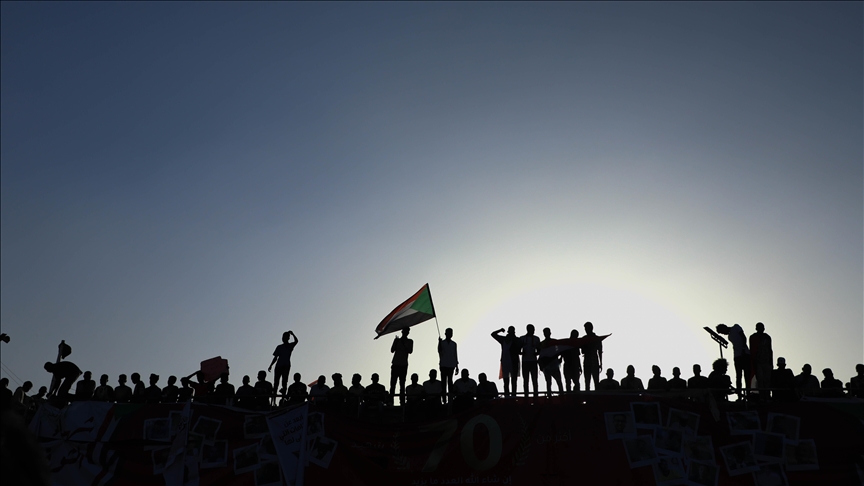RSF cannot run parallel government, using claim as ‘bargaining chip’ after Sudan army’s gains: Experts
Analysts say the RSF’s announcement of a parallel government is a ploy to gain legitimacy as it suffers losses on the ground to the Sudanese Armed Forces

- Analysts say the RSF’s announcement of a parallel government is a ploy to gain legitimacy as it suffers losses on the ground to the Sudanese Armed Forces
- The RSF lacks the administrative apparatus, economic strategy, and public support needed to govern effectively, says Sudanese analyst Jihad Mashamoun
- RSF’s leader appears to be borrowing tactics from South Sudan’s independence movement, while also exploiting global demand for resources like gold and rare earth minerals, says political scientist Abiol Lual Deng
ISTANBUL
For the first time since war erupted in the country more than two years ago, Sudan’s transitional government recently convened a full Cabinet meeting in the capital, Khartoum, in what officials hailed as a symbolic step toward restoring national authority.
Chaired by Prime Minister Kamil Idris, the meeting marked a rare moment of institutional continuity after months of violence between the army and the paramilitary Rapid Support Forces (RSF). The state news agency SUNA described it as “a symbolic step toward the return of state institutions to the capital, amid ongoing security arrangements to ensure stability.”
The move came just weeks after the RSF paramilitary-led coalition announced the formation of its own “Presidential Council for the Transitional Peace Government,” a parallel body that claims authority over territories under its control.
The RSF’s declaration has sparked debate among observers, who question its legitimacy and view it as a bargaining chip in negotiations as it suffers losses on the ground.
“This (RSF) announcement is actually more of a reaction to the de facto government formed by Lt. Gen. Abdel Fattah al-Burhan, who assigned Kamil Idris to form the government,” Sudanese analyst Jihad Mashamoun told Anadolu.
Idris, sworn in as prime minister on May 31, unveiled his 22-member “Government of Hope” Cabinet in June.
Mashamoun noted that the RSF lacks the machinery to administer a parallel government. “So, basically, they (RSF) are doing this as a bargaining chip to encourage the international community to see it as a credible negotiator,” he said.
The international community has rejected the RSF’s claims, with regional organizations such as the African Union and Arab League refusing to recognize the body.
Mashamoun argued the RSF may be seeking de facto recognition from regional states, similar to the situation in Libya.
Abiol Lual Deng, a South Sudanese-American political scientist, said the RSF’s gambit echoes Sudan’s turbulent history. “RSF is very much in keeping with the history of Sudan, where struggles focus on regional or ethnic grievances and push for parallel governments,” she explained.
She noted that RSF leader Mohamed Hamdan Dagalo, or Hemedti, appears to be borrowing tactics from South Sudan’s independence movement, while also exploiting global demand for resources like gold and rare earth minerals.
“There’s some deep realpolitik going on, in the sense that he’s taking advantage of a situation in which the entire world is shifting in terms of dynamics and there’s increasingly a market for things like gold and other rare earth and other minerals.”
- Military gains and shifting strategy
The RSF’s declaration also reflects its battlefield reversals, according to Mashamoun. “This is more than once that the Sudanese Armed Forces (SAF) and their allied units have removed RSF support forces from central Sudan … They have been pushed back into Kordofan and later into Darfur,” he said.
He added that the RSF’s announcement was a reaction to being expelled from Khartoum and central regions by the SAF.
“There is traction happening back and forth in Kordofan, but the army is making progress,” he said. “The RSF is trying to hold Kordofan to show they’re strong enough to justify forming a parallel government.”
Since April 2023, fighting between the army and the RSF has killed more than 20,000 people and displaced 15 million, according to UN figures.
Despite its claims of authority, experts say the RSF struggles to maintain law and order in areas under its control.
“In the four regions where the RSF wields control, there’s no real control,” Mashamoun observed. “If you read local reports, you’ll find these groups are fighting one another. There is infighting happening between them.”
He questioned whether communities in RSF areas genuinely support the militia. “They are forced to stay in these areas because of the war, not because they want to be part of the government of the RSF or Hemedti’s group. It’s because they’re forced to by the reality of war,” he said.
Some observers have likened Sudan’s rival governments to Libya’s fractured model, but Mashamoun remains skeptical: “I am not convinced we can see a partition of Sudan like Libya, because who’s going to run the civil bureaucracy for this group? How are you going to provide birth certificates, passports, health or education?”
He argued that the RSF lacks both the administrative apparatus and economic strategy to govern effectively.
Looking ahead, Mashamoun outlined two scenarios for ending the war, the first being that both sides conclude that it is not in their interest to continue fighting.
“The second, and most important, option is that civilians decide to have internal elections … They come together after these internal elections … to form … a parliament, and then from the parliament a government and a Cabinet is made.”
Anadolu Agency website contains only a portion of the news stories offered to subscribers in the AA News Broadcasting System (HAS), and in summarized form. Please contact us for subscription options.







